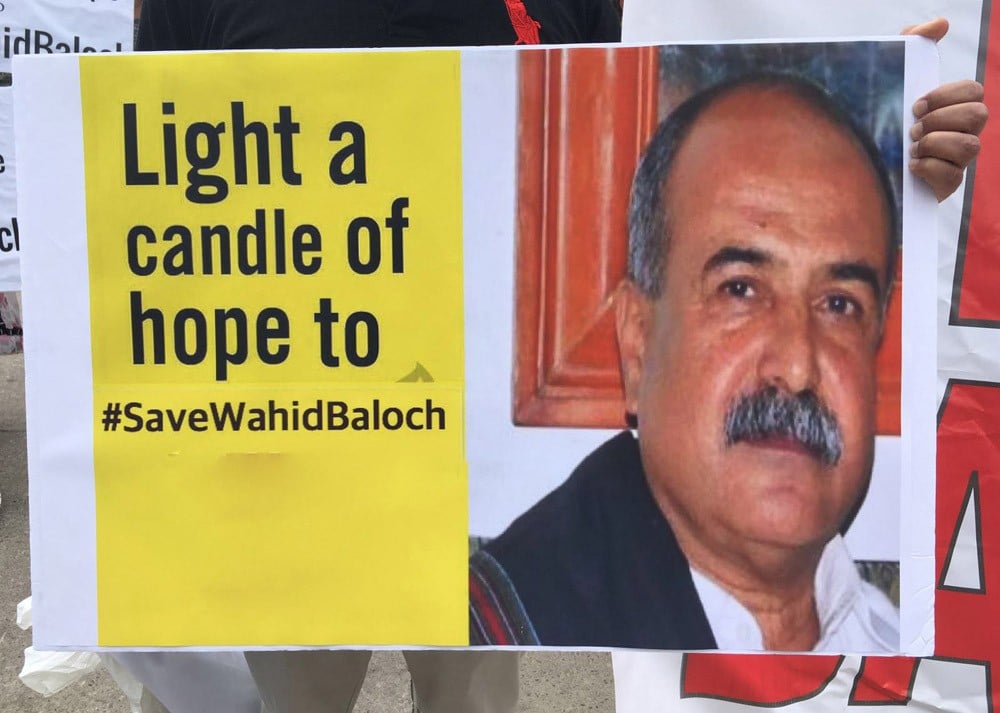
Why is the mainstream media silent on Wahid Baloch’s abduction in broad daylight?

Adjacent to the Malir River Bridge in Karachi is the Sayad Hashmi Reference Library -- the main hub of Baloch literary activities. Founded by slain Baloch literary figure Saba Dashtyari in March 2005, it is the first and only reference library on Baloch history and culture. Students, researchers and literary activists regularly visit the library, a repository of all rare Balochi periodicals and books, to study.
However, Abdul Wahid Baloch, one of the library’s caretakers and founding members, is not seen in the library since July 26. He was taken away by men in plain clothes from Super Highway Toll Plaza in the outskirts of Karachi on the afternoon of July 26. Wahid was coming back from interior Sindh with his friend Sabir Naguman, a Balochi poet, after attending a ceremony. Naguman asked the armed men to take him too. When he resisted, masked men pushed him away, he tells Wahid’s family.
Wahid’s family alleges that he has been picked up by the security agencies. They tried to file a case of abduction at the Gadap police station several times but they were refused an FIR and only a complaint against unknown persons was registered in the police’s daily diary. The local police tells TNS they have no information about who took Wahid or his whereabouts.
After failing to register a case with the police, Wahid’s family approached the Human Rights Commission of Pakistan (HRCP) and sought their help. Also, dozens of political and civil society activists gathered at the HRCP Karachi office on August 2 to show their concerns on his abduction and police’s behaviour.
Asad Iqbal Butt, HRCP’s vice-chairperson, says the human rights body has already a constituted a three-member fact-finding committee to probe the abduction of Wahid. "The fact-finding committee’s members will meet with Wahid’s family and law enforcement agencies and visit the place where he was abducted," Butt tells TNS. "At the toll plaza, there is a police station and Rangers’ check post. How could a man be whisked away from there so easily?"
He demanded that the government order an immediate investigation into Wahid Baloch’s fate and whereabouts, keeping his family fully informed and updated at all times.
After the police refused to register an FIR even a week after the incident occurred, the family filed petition on August 2 in the Sindh High Court for the disappearance of Wahid Baloch. The court has given August 15 as the date of hearing.
Wahid, in his fifties and a father of four, popularly known as Comrade among Baloch political and literary circles, was raised in Lyari. He was actively involved in literary and political movements. On Sundays, he was regularly seen searching old books scattered on a street of Regal Chowk.
Ramazan Baloch, a close friend of Wahid who has recently authored a book on Lyari, says that even though Wahid was nourished in poverty, his inclination as a child towards reading books other than syllabus made him prominent as he grew up.
"This was the time when some study circles existed in Lyari where progressive political thinkers and social veterans used to sit to carry out political discussions. Wahid was among the youth who attended these gatherings and it was here that he learned about literature, Russian Revolution, progressive and enlightened writers and poets, Arab nationalism and importance of love to humanity," Ramazan tells TNS.
His close friends insist that Wahid Baloch was not affiliated with any political party but, during the Movement for Restoration of Democracy in the 1980s, he took part in the movement against Zia dictatorship and followed Mir Ghous Baksh Bizenjo, a prominent Baloch politician. In recent years, he was mainly involved in organising rallies and press conferences calling for the recovery of Baloch victims of abductions and participated in such protests with his children. "Wahid mainly helped the families of missing persons to publish their posters," says a Baloch activist, who also regularly took part in such protests.
Apart from his activism, his unconditional and tireless support to promote Balochi language, especially when it came to getting the works published, make him popular among the Baloch literary circles across the region. He also served as editor for a Balochi literary monthly Labzank and helped the Baloch poets and literacy activists to publish their work.
He organised all kinds of Balochi literary, musical, cultural and educational activities across the city, mainly its Baloch-populated neighbourhoods, with donations from community members. Wahid helped Dashtyari in establishing Sayad Hashmi Reference Library in Malir.
His day job was working at Karachi’s Civil Hospital as a telephone operator and he also served as president of the hospital staffers association.
While the mainstream media is choosing to stay largely silent on Wahid Baloch, the news of his abduction is attaining the form of a movement on the social media.